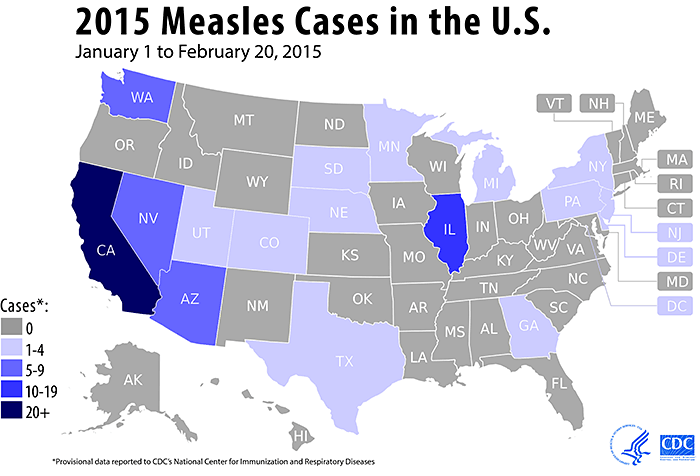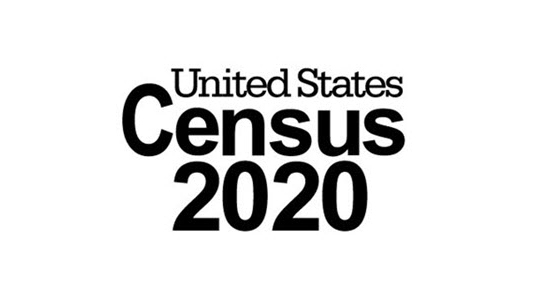Disneyland is commonly referred to as the happiest place on earth – a fun-filled, attraction-packed amusement park for children and adults alike. Each year, over 16 million people travel to California to visit the park and then return home satisfied after their stay. Between January 1st and February 20th this year, however, 154 people from 17 different states were reported to have contracted measles, and 118 of these cases were linked directly to Disneyland.
According to the Centers for Disease Control (CDC), the majority of the people who had been infected were unvaccinated against measles [1].
This ongoing outbreak has garnered national media attention and sparked a hot-topic debate that essentially began in 1796, after Edward Jenner created the first modern vaccine. The main question is: should vaccinations be made mandatory?
Currently, the CDC recommends 28 doses of 10 different vaccines for children under 6 years old. Although there are no federal laws that mandate vaccinations, all 50 states have public school requirements.
Most of these states, however, also allow for parents to exempt their children based on medical, religious, and even philosophical reasons.
While some parents refuse vaccination based on the fear of an adverse effect (30,000 reactions reported since 1990), others argue that government-mandated vaccines would violate their constitutionally protected religious and personal freedoms. Supporters of required vaccinations, on the other hand, highlight the benefits: the
CDC estimates that 732,000 lives were saved and 322 million cases of illness were prevented since 1990 through vaccinations alone [2].
So is there a definitive answer to this question? Is this question even relevant on an individual level? According to the Colorado School of Mines Health Center, “Colorado state law requires new freshman, transfer and graduate students submit proof of two doses each of measles, mumps and rubella vaccines. This is a mandatory requirement for all college students born on or after January 1, 1957” [3]. To be a student at Mines, vaccinations are mandated. But to be a citizen of the United States, should these same requirements be held?
Surveying Science
According to a new survey performed by the Pew Research Center, only 13% of polled professional scientists thought that parents should be allowed to have their children exempted from vaccines. 30% of the general public, however, believed that vaccinations should be a choice [4]. So what is causing this gap between scientists and the public? Does science hold information that the average U.S. citizen does not?
Matthew F. Daley and Jason M. Glanz (a pediatrician and epidemiologist, respectively) bring the growing numbers of deliberately unvaccinated children under the spotlight in their article “Straight Talk about Vaccination,” which was published in “Scientific American”.
Based on responses to pediatricians, parents are mainly unwilling to vaccinate their children because they either do not think their children are at risk for diseases or they believe the vaccines themselves are innately dangerous.
The first reason – no risk for infection – can be proved false by the use of a study performed here, in the state of Colorado.
By examining hundreds of thousands of both vaccinated and unvaccinated subjects, it was found that “unvaccinated children were roughly 23 times more likely to develop whooping cough, nine times more likely to be infected with chickenpox, and 6.5 times more likely to be hospitalized with pneumonia or pneumococcal disease than vaccinated children from the same communities” [5]. From these numbers, it is clear that denying vaccinations increases the chance of disease.
According to Daley and Glanz, the second main objection – a fear of the vaccines causing more harm than good – stems from misinformation spread by both the media and the use of the internet. Although there are always risks to vaccines (with small percentages of adverse reactions), there have been some major claims questioning safety over the years that have served to strengthen the anti-vaccine movement. The most famous of these theories was published in the Lancet in 1998 by Andrew J. Wakefield, who claimed that the measles vaccine could cause autism in young children. Since then, many studies have disproved this claim and the article was later retracted in 2010. Despite the proof that this theory is false, a recent survey showed that around 25% of 1500 participants still believed it to be true [5]. This example serves to demonstrate the disconnection between science and the public. As a whole, however, despite any conflicting public opinion or misinformation, science shows that vaccines help protect children against diseases, with little risk.
Possible Policies
Now that science has shown that children should be vaccinated, the question still remains: should governments mandate their vaccinations? Vaccination policies vary greatly between different nations. Some countries have no requirements of any kind, while others have completely mandated programs. Here in the United States, there are mandated vaccines at the state level for children attending public school, but these policies lack consistency and often times, compliance. Professor Becky Lafrancois, from the CSM Economics and Business Department, offers her opinion on the topic:
“From what I have read, around a 95 percent vaccination rate is needed to provide community level immunity so as not to infect the 1 percent of the population who, for medical reasons, cannot be vaccinated. In Colorado, the vaccination rate amongst kindergarteners is only 82 percent on average, the lowest rate in the nation. From an economics perspective, it is clear that Colorado falls well below the socially optimal level of vaccination. The additional benefits to society from increasing vaccination rates likely outweigh the additional costs from doing so. Given this, there is a strong argument for some kind of government intervention in the vaccination market here in Colorado. There are several potential solutions, including a mandate. Another idea would be to impose a fine on those parents who choose to not vaccinate their children.”
There are currently other countries who have put some of these suggested solutions into place in order to increase vaccination rates. For example, Australian parents receive payments for every child that meets the state’s set requirements. The Slovenian government has implemented one of the strictest vaccination policies in the world by fining those who do not receive nine base vaccinations. Other nations provide vaccines free of charge as an incentive to receive them [6]. Essentially, there are many different policy options that could be implemented to increase vaccinations within the U.S. As citizens of Colorado – the least vaccinated state in the country – Mines students should begin to consider what needs to change about state policy.
The Whole Picture
The measles outbreak at the beginning of this year shows that the United States’ current vaccination policy is not achieving socially optimal results. The anti-vaccination movement, which contradicts research, is continuing to grow as the gap between science and public opinion widens. To stop these outbreaks, action needs to be taken. The action must take religious and personal freedoms into consideration, yet still manage to increase vaccination rates. Perhaps the solution is to better educate parents about the risks of declining vaccinations for their children. Or maybe fines for lack of compliance should be implemented. No matter the course of action, however, the Disneyland measles outbreak demonstrates that the U.S. vaccination policy needs to change.





'Measles Outbreak Reignites Vaccination Debate' has no comments
Be the first to comment this post!